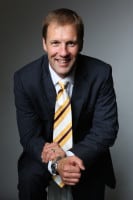Podcast: Play in new window | Download
Subscribe: RSS

I have a home office that I work out of. People often assume that it’s nice working from home and I must get SO MUCH WORK DONE, since I don’t commute to work. Now, when I first began this venture, I read a book about how to work from home. The book said that if you have a family, prepare yourself! Because your family will have a very hard time leaving you alone.
I read this and thought, “Oh, no. Not my family. My family is considerate, thoughtful, and loving. They would never interrupt important work. That would be unthinkable.”
What I have learned is that working from home with a family is like trying to concentrate while riding a Tilt-A-Whirl, sitting on a working Whack-A-Mole machine that’s on fire. It’s all the distractions of work AND all the distractions of home rolled into one big, stressful package.
If you had the interruptions at work that you do while working at home, you’d have to quit! No person could put up with it.

Imagine if you were an accountant. You are concentrating, feverishly working at your desk…
Knock, knock.
Yes?
Hey… I’m bored.
Knock, knock.
Yes?
Have you seen my sock?
Knock, knock.
I’m sad.
Knock, knock.
I’m lonely.
Knock, knock.
What time is it?
Knock, knock.
Could you run me over to Jack’s house?
Knock, knock.
Can Jack come over?
Knock, knock.
I don’t like Jack anymore.
Knock, knock.
What do girls think about?
Knock, knock.
I mom a girl?
Knock, knock.
Are you a girl?
Knock, knock.
Do my armpits smell bad to you?
Knock, knock.
How ‘bout now?
Knock, knock.
Now?
Knock, knock.
What’s the capitol of New Brunswick?
Knock, knock.
Wanna hear me do a knock-knock joke?
Knock, knock.
Do you think this rash is contagious?
Knock, knock.
You’re being boring.
Knock, knock.
Still boring!
Knock, knock.
Hey, you don’t look like you’ve gotten much work done today.
Knock, knock. Knock, knock. Knock, knock. Knock, knock!
Your family knows that you are working, in theory. But, they can’t get past the fact that you’re sitting in front of them, but not at their disposal. Even your spouse… in theory, she understands what you’re doing. But, not really.
I’ll sometimes complain something like, “You people have interrupted me all day, and I couldn’t get my taxes done.”
And she’ll reply, “Oh, that’s too bad. I know what would help you… go out and clean the backseat of the car!”

Next, my southern buddy Clayburn Cox calls into the show. Now, Clayburn is a high school teacher by day and entertains thousands by nights (and weekends)… kinda like a comedic super hero.
So, before school, he hits the gym on some days. One day, Clayburn forgot to put on his deodorant between working out and going to work. During his first block of classes, nobody seemed to notice. But, during his prep period, his teacher’s aid came into the room, sniffing out loud like a basset hound. He eventually hunted down the odor until he was standing right over Clayburn and said, “It stinks in here, Mr. Cox.” Not willing to give up the goose, Clayburn played along. “You’re right. It does kinda stink in here, doesn’t it?”
“It smells like B.O. in here”, said the T.A.
Well, Clayburn was the only other person in the room, so he had to confess and explain that he hadn’t put on deodorant after working out. “But, please don’t tell anybody. It won’t happen again”, he told his assistant.
That should be the end of the story.
However, when the next class came in, Clayburn was incredibly self-conscious. He kept his elbows in at his ribs, looking like a Tyrannosaurus Rex as he taught the class. His hope was that there were so many teenagers in the room, anyone who smelled the stench would assume it was coming from some stinky sophomore. But, apparently, the smell was so bad that students started asking if he kept any Lysol in the room.
“Yes, it’s over there”, said Clayburn, as he pointed across the room with his elbows still glued to his ribcage. But, as long as they didn’t realize the stink was emanating from him, he figured he was in the clear.
That’s when he walked away from his desk and overheard one of the girls say, “Spray it over by his desk, because that’s where he’s been standing.”
Apparently the news got out.
If only he kept a brick of Right Guard in his desk.

Finally, my old friend, business strategist and best selling author of The Trust Edge, David Horsager joins the show with some amazing advice for all of us who need to get more done!
Many years ago, David and I performed on many of the same stages – me telling jokes and David mystifying the audiences by sawing his wife in two.
And now he makes a living talking to corporations about trust.
What’s interesting is that the people who seek his wisdom today – the New York Yankees, FedEx, Wells Fargo, United Health Group, and the like – have no idea about his “past life”. But, those days of speaking at youth conferences, and performing grand illusions in front of rowdy audiences built his ability today to hold the attention of an audience of 5,000 sales people, or a boardroom with a dozen CEO’s.
One issue that David most often addresses in companies isn’t their profit margin problems, but their “trust problems”.
As David puts it, a lack of trust is any organization’s biggest expense. If anyone thinks that trust doesn’t affect the bottom line, just ask Brian Williams or Tiger Woods. In Tiger’s case, one breach of trust (or 27 depending on whose math you’re using) turned into a loss of $110 million in two weeks in endorsement dollars.
The nice thing is that there is an absolute way to build trust in any relationship or organization. He calls it the “Eight-Pillar Framework”. And what David and his team does is walk his clients through these eight pillars with the goal of establishing and maintaining trust through their organizations.
In his latest book The Daily Edge, David focuses more on getting things done on a day-to-day basis. The first several pages goes right along the same plan that David used to lose 50 pounds in five-and-a-half months. It’s also the exact same idea that his clients have used to triple their sales. And, it’s the same set of ideas that have saved many a marriage.
The key is to eliminate those days where you feel like you worked hard all day, but didn’t accomplish anything. And to accomplish this, David has laid out several very actionable concepts that anyone can begin applying to their days right away.
For example, one hurdle that gets in most people’s way is a lack of focus. To get over this hurdle, David suggests removing distractions and becoming very clear on what your most important thing is.
But how?
First off, shut off distractions. Turn off the chime on our phone or computer each time a new email arrives. Instead, check your email at the top of every hour, or three times a day, when you can check ten or twenty at a time instead of being distracted by every single email every couple of minutes. Some people may think that this runs against an “Open Door Policy” that would develop trust and relationships. However, there are times for “Closed Door Policies” when you can isolate yourself and get stuff done for those very same people! Now, you want to have an “Open Heart Policy”, where you love people and are available to them at the appropriate times, but you also want to be able to accomplish things and serve those very same people… which means you need to focus.
I work at home and have four children, so I haven’t had any focus for seventeen years!
David also talks about DMA’s – Difference Making Actions. If you look at your to-do list with 600 items and immediately become overwhelmed, DMA’s are for you!
The DMA idea goes back to the first person in America to earn a $1 million per year salary, Charles Schwab. A consultant “loaned” the idea to Mr. Schwab, who in turn used it to great advantage. “What do I owe you for this?” asked Charles. “It’s helping me develop so much more focus and clarity and accomplish so much more!”
“Just use it for a few months and pay me whatever you think it’s worth”, was the reply.
A few months later, Schwab wrote the man a check for what would be equivalent to $250,000 today… for an idea!
Here’s the idea: take a post-it note (NOT ELECTRONIC), and each day write down the top five things you can do that day to move your goals forward. This means you firstly have to be able to identify your top priority. Then start having F.U.N.!
- F stands for “First thing is first”. You need to address your list of five items in order.
- U stands for “Under your main priority”, which keeps your activities focused on the number one, most important thing.
- N stands for “Number attached”. You need to have a quantifiable number attached to your goals. Instead of saying “I’m going to clean my desk”, you should say “I’m going to clean two drawers of my desk”. If you work in sales, you can’t say, “I’m going to make more calls”; but instead say, “I’m going to make five calls.” And this number cannot be relevant to what other people do. It needs to be self-reliant.
By doing these easy and actionable steps, you feel better about accomplishing your goals at the end of each day, and you’ll see immediate results!
But what if you are faced with a single, overwhelming project and you don’t even know where to start?
To get “unstuck”, David recommends breaking down that huge project into little sub-components and tackle one of those at a time, even if you don’t start at the beginning. This often begins by asking yourself, “Where could I start?”. For instance, if you are an author and simply can’t get that first chapter rolling, jump to the middle somewhere of your ideas and start writing. Eventually, the beginning will come to you and you can write your into at that point, rather than hitting your first chapter wall over and over again and not getting any of the ensuing chapters finished. In other words, momentum builds momentum. If you get stuck, just start somewhere and let your momentum build until the project is completed.